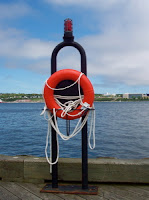 Okay - this will be the last blog about blogging for a while. But I wanted to take up the conversation about professionalism on the blog and the question Wendell raised: Whose views am I representing, to whom, and to what end? Blog posts often feel to me like snapshots. They open windows and offer insights that can be deep and wide but also fleeting. Rebecca Blood says in Waging peace: using our powers for good,
Okay - this will be the last blog about blogging for a while. But I wanted to take up the conversation about professionalism on the blog and the question Wendell raised: Whose views am I representing, to whom, and to what end? Blog posts often feel to me like snapshots. They open windows and offer insights that can be deep and wide but also fleeting. Rebecca Blood says in Waging peace: using our powers for good,
The weblog form itself encourages spontaneous blurts. But there are people from all backgrounds on weblogs and beyond, composing carefully considered opinions every day. And that, I think, can be our mandate. To spend a little bit of our weblog time in trying to understand the truth of those who see the same events, differently; in trying to illuminate the inexplicable human beings that surround us.
How to do that? Here are excerpts from RB's 10 Tips:
Determine your purpose. Know your intended audience. ...Knowing for whom you are writing will allow you to adopt an appropriate tone. Be real. ...Speak in a real voice about real things. A weblog is the place for strong opinions, whether about politics, music, social issues, gardening, or your profession. The more engaged you are with your subject, the more interesting your writing will be. Establish your credibility. To the best of your ability, be truthful. ...Understand that on the Internet, your words may live forever, ...I propose a set of Weblog Ethics; think about your own standards, and then adhere to them.
 We are experimenting with how to achieve all of this in one space - how to be appropriate and authentic, personal and professional, a strong voice and credible, engaging and respectful of our audience. We are counting on you - our readers - to help us. RB concludes in Waging peace,
We are experimenting with how to achieve all of this in one space - how to be appropriate and authentic, personal and professional, a strong voice and credible, engaging and respectful of our audience. We are counting on you - our readers - to help us. RB concludes in Waging peace,
In the twenty-first century, the world demands that we broaden our view, not narrow it further. ...The insightful weblogger has an opportunity to elucidate and navigate the unknown for readers instead of pulling the gate shut behind them. The webloggers have always been Web travelers. Let us bring home thoughtful stories of little-understood cultures, especially when that culture belongs to the man [or woman] next door.












































